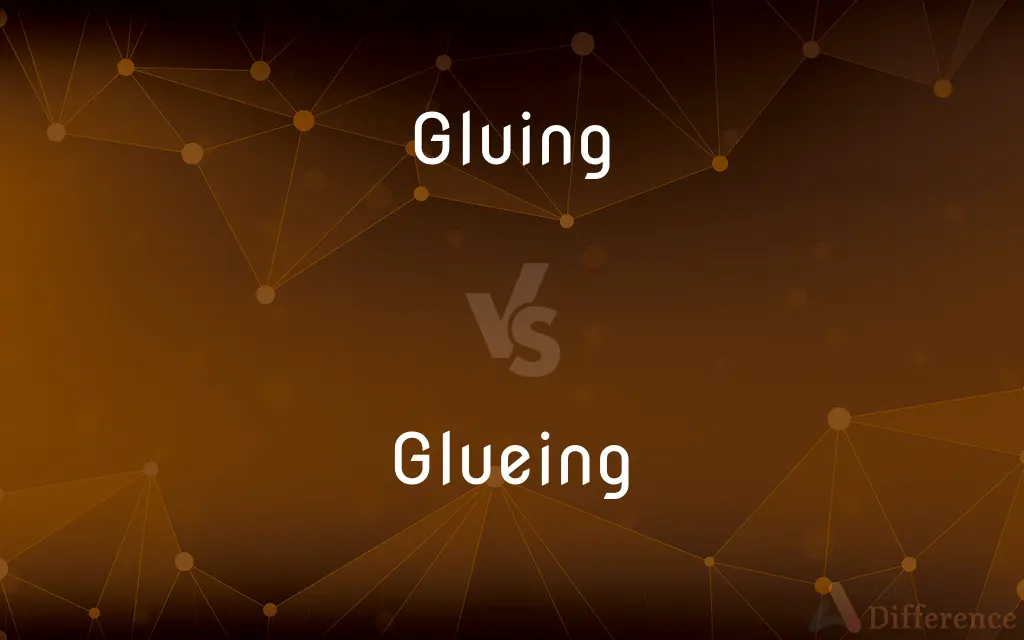Gluing vs. Glueing — What's the Difference?
By Fiza Rafique & Urooj Arif — Updated on March 21, 2024
Gluing is the more commonly used form, emphasizing the action of using an adhesive to bond items. Glueing, less frequent, follows a variant spelling but retains the same meaning.

Difference Between Gluing and Glueing
Table of Contents
ADVERTISEMENT
Key Differences
Gluing typically refers to the process of applying an adhesive substance to join two or more items together. This method is widely used in various crafts, construction, and manufacturing industries due to its effectiveness and versatility.
The term 'gluing' is more prevalent in American English, and its usage spans a broad range of applications, from simple paper crafts to complex engineering projects. On the other hand, glueing, while conveying the same action and purpose, is less commonly used.
This variant spelling follows a more phonetic approach, aligning with the base word 'glue.' Despite its lesser popularity, 'glueing' is understood in the same contexts as 'gluing,' and the choice between the two often comes down to regional preferences or individual style.
Comparison Chart
Pronunciation
/ˈɡlo͞oiNG/
/ˈɡlo͞oiNG/
Commonality
More commonly used, especially in American English
Less common, but understood in the same contexts
ADVERTISEMENT
Spelling Variation
Standard spelling following typical English conventions
Variant spelling, more phonetic based on the word 'glue'
Usage
Preferred in formal and technical writing
Occasionally seen in informal or less standardized texts
Context
Applies to a wide range of materials and industries
Same as gluing, with no difference in application or meaning
Compare with Definitions
Gluing
The act of applying an adhesive to attach items.
Gluing the broken vase required a strong adhesive.
Glueing
Also refers to the act of using adhesive for attachment.
Glueing the pieces together was trickier than expected.
Gluing
A method used in various crafts and construction.
Gluing beads onto the fabric added a unique texture.
Glueing
Found in the same crafts and construction contexts.
Glueing sequins on the dress took hours.
Gluing
Essential in woodworking for joining pieces.
Gluing the joints ensured the table's durability.
Glueing
Can offer both temporary and lasting solutions.
Glueing the note to the door was meant to be a temporary message.
Gluing
Can be a temporary or permanent solution.
Gluing the poster to the wall was a temporary fix.
Glueing
Requires choosing an appropriate adhesive type.
Glueing these materials together demanded waterproof glue.
Gluing
Involves selecting the right adhesive for materials.
Gluing metal to plastic required a special glue.
Glueing
Used in woodworking and similar applications.
Glueing the shelf brackets in place was a crucial step.
Gluing
A strong liquid adhesive obtained by boiling collagenous animal parts such as bones, hides, and hooves into hard gelatin and then adding water.
Glueing
Present participle of|en|glue|nodot=1|nocat=1}}; {{alternative spelling of gluing
Gluing
Any of various similar adhesives, such as paste, mucilage, or epoxy.
Gluing
An adhesive force or factor
Idealism was the glue that held our group together.
Gluing
To stick, fasten, or cause to adhere
Glued the broken leg of the chair together.
Gluing
To cause to be focused on or directed at something
Our eyes were glued to the stage.
Gluing
Present participle of glue
Gluing
The act of attaching something with glue.
Gluing
(topology) A connection between the edges of two planes, or between the points at the ends of two lines.
Common Curiosities
Is "gluing" more common than "glueing"?
Yes, "gluing" is more commonly used, especially in American English.
Can glueing be considered correct?
While less common, "glueing" is still considered correct, especially in informal contexts.
What does glueing mean?
Glueing means the same as gluing, involving the use of adhesive to bond materials.
What factors influence the choice between gluing and glueing?
The choice often depends on regional spelling preferences and individual style.
Can both gluing and glueing be used in formal writing?
"Gluing" is generally preferred in formal writing, but "glueing" can be acceptable in less formal contexts.
What is gluing?
Gluing is the process of applying glue to attach or join items together.
Can gluing be undone?
Depending on the adhesive, some glued bonds can be undone using specific solvents or techniques.
Are there any differences in application between gluing and glueing?
No, both terms refer to the same process of using adhesive to join items.
Does the method of gluing vary with materials?
Yes, the gluing method and type of glue used can vary depending on the materials involved.
Is gluing used in specific industries?
Yes, gluing is widely used in crafts, construction, woodworking, and many other industries.
Are there adhesives specifically designed for gluing certain materials?
Yes, there are specialized adhesives tailored for specific materials and bonding requirements.
Are there environmental considerations with gluing?
Yes, the choice of adhesive and disposal of excess glue can have environmental implications.
Can gluing be a permanent solution?
Gluing can offer both temporary and permanent bonding solutions, depending on the adhesive used.
Is expertise required for effective gluing?
While basic gluing is straightforward, certain applications may require expertise for optimal results.
Does glueing require any special tools?
Some glueing tasks might require specific tools, like clamps for woodworking, to ensure a strong bond.
Share Your Discovery

Previous Comparison
So vs. Very
Next Comparison
Swathe vs. SwathAuthor Spotlight
Written by
Fiza RafiqueFiza Rafique is a skilled content writer at AskDifference.com, where she meticulously refines and enhances written pieces. Drawing from her vast editorial expertise, Fiza ensures clarity, accuracy, and precision in every article. Passionate about language, she continually seeks to elevate the quality of content for readers worldwide.
Co-written by
Urooj ArifUrooj is a skilled content writer at Ask Difference, known for her exceptional ability to simplify complex topics into engaging and informative content. With a passion for research and a flair for clear, concise writing, she consistently delivers articles that resonate with our diverse audience.
















































